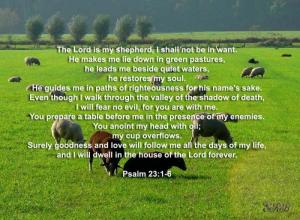The 23rd Psalm, one of the most popular Psalms (if not the most ‘famous’ or popular), is very well known. It ranks among the first portions of scripture young kids memorize and/or are read as a child (behind John 3:16 of course). I was not aware until recently that this is more than just a poem in Psalms.
Psalms 23 is a good example of a pastoral poem or the pastoral mode. The typical pastoral poem loosely depicts life in the way of a shepherd or someone living in a rural area ‘in the hills and backcountry.’ These poems are not concerned with the modern urban lifestyle. Other common themes include love, death and combinations and contrasts between the two. Some people say that, since the subject of shepherds takes a step back from the urbanized lifestyle, these types of poems are meant to be satirical and critique society. On a deeper meaning, the concept of attachment to nature is prevalent.The 23rd Psalm is one of the earliest examples of pastoral poetry, as the pastoral mode style became more well known and widely used during William Shakespeare’s era. The date of writing is one of the main differences between modern pastoral poems and this Psalm.
What makes the 23rd Psalm a pastoral poem? There are some key signal phrases that contain typical components in pastoral poetry. The first line: “The Lord is my Shepherd;” starts this Psalm out on the pastoral track, as shepherds/ rural life farmers are usually the subject of these types of poems.
As the Psalm continues: “He makes me lie down in green pastures; He leads me to water in places of repose; He renews my life; He guides me in right paths as befits His name.” The reference to green pastures, and water, as well as guidance from above also are typical findings in a pastoral poem.
Another quality of the pastoral mode is peacefulness, serenity, and tranquility of the non-urban lifestyle. This is referenced in the beginnings of the Psalm. When I think of still waters and green pastures I think of being comfortable and relaxed, a similar feeling to Zac Brown Band’s song Toes (toes in the water, a$$ in the sand, not a worry in the world…). This is often contrasted to the city or not peaceful/as pleasant as rural lifestyle in these kinds of poems. As this Psalm goes on, it does this contrast. “Though I walk through a valley of deepest darkness, I fear no harm for You are with me; Your rod and Your staff-they comfort me.” Other translations use the phrase “walk through the valley of the shadow of death” which sounds fiercer and very unpleasant. It also reverts back, mentioning comfort and not fearing, which is another typical aspect of a pastoral poem.
A common aspect of the pastoral mode is the -elegy (eulogy), in which someone or something’s death (actual physical death or metaphoric death) is lamented. This is not very prominent in the 23rd Psalm, although discussions of the afterlife are indirectly discussed to end the Psalm: “Only goodness and steadfast love shall pursue me all the days of my life, and I shall dwell in the house of the Lord for many long years.” The final verse of the short poem has more of a social tone, but still drives the subject of goodness home.
As one of the most quoted Psalms, the 23rd Psalm has a deeper meaning. The whole thing is a metaphor/symbolic for a deeper meaning of blessings, enemies, eternity, goodness, grace, and the riches of God. There are many reasons as to why it is popular in today’s societies. It is easy to read, pertains to a wide array of people/audience, and does not have a very deep meaning, as other scriptural portions of the Bible do. I predict it will stay popular for many years to come, as long as it is still being quoted and Bibles are still being printed.
As a pastoral poem, the 23rd Psalm can be interpreted in multiple ways. Many modern movements regarding environmentalism and ‘going green’ (for example: biofuel & alternative fuel production, ethanol, reduced coal dependence, reduced petroleum dependence, recycling, clean water movement, etc.) could potentially look into pastoral poems and other pastoral styles (art, music, literature, etc.) to further signify their viewpoints.
